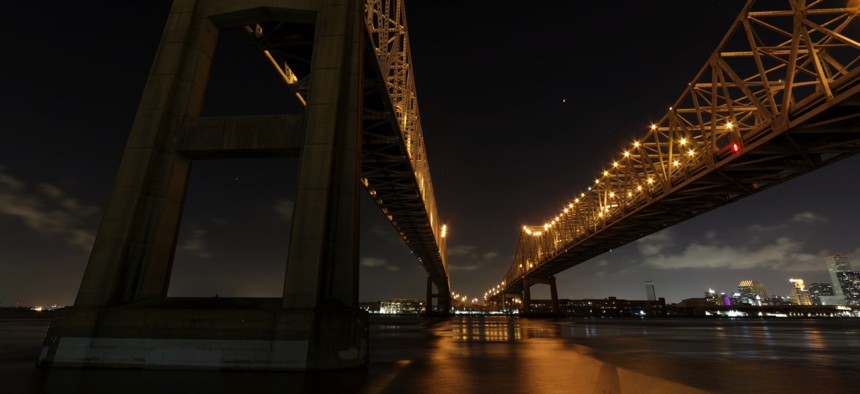‘For All Practical Purposes, Louisiana Is in Its Own Recession’

The Crescent City Connection crosses the Mississippi River in New Orleans. Pierre-Jean Durieu / Shutterstock.com

Connecting state and local government leaders
As the state’s budget situation worsens, revenue estimates are revised downward.
The fiscal outlook in Louisiana was gloomy Wednesday, as officials there adopted lower revenue projections, which indicate the state will have to grapple with a budget deficit of more than $850 million in the coming months.
General fund revenues were revised downward by $570 million for this fiscal year, and by $744 million in the upcoming budget cycle, which will begin July 1. A panel known as the Revenue Estimating Conference adopted the weaker revenue estimates unanimously.
Louisiana’s 2015-16 budget plan includes about $25 billion in spending, with roughly $9 billion in general fund expenditures.
The lower general fund projections for this year come on top of $300 million in other previously identified shortfalls—about $250 million of which are tied to Medicaid. This means the state is now facing an overall budget gap of about $870 million in the current, 2015-16 fiscal year. In the 2016-17 fiscal year, the state is currently expected to be lacking about $2 billion.
“We’ve got weakness in the corporate sector, we’ve got weakness in the personal income sector, we’ve got weakness in the sales tax sector, we’ve got weakness in the minerals sector,” Greg Albrecht, a chief economist in the Legislative Fiscal Office told the panel.
“For all practical purposes, Louisiana is in its own recession,” he added.
The revised projections were adopted as state lawmakers prepare for a special 25-day legislative session, which is set to begin Sunday. Gov. John Bel Edwards, a Democrat who took office in early January, called for the session to address the state’s fiscal woes.
“Louisiana faces an unprecedented budget challenge that, if left unresolved, will devastate state government as we know it and impose unimaginable cuts to higher education, health care and other vital services the state delivers to our citizens,” Edwards said in a statement on Wednesday after the revenue estimates were revised.
“This is a fiscal crisis, the likes of which we have never seen,” he added. The governor also stressed that he does not believe savings alone can solve the crisis. “We will need to work to find additional revenue to continue delivering the most basic of vital state services,” he said.
Edwards plans to address state residents in a television broadcast on Thursday.
In January, he released a list of options for stabilizing the current fiscal year’s budget, which included tapping the state’s rainy day fund, redirecting money from the first year of Deepwater Horizon oil spill payments to the state, and cutting at least 10 percent of $1.6 billion in discretionary spending that is not protected by Louisiana’s constitution.
The governor has also floated the idea of adding an additional cent to the state’s existing four-cent sales tax. His office says that measure would raise $216 million before June 30.
For the long-term, the governor has proposed changes to income tax brackets in Louisiana, along with lowering and eliminating certain deductions now available to state taxpayers.
Among the other plans he has suggested: increasing the tobacco tax to $1.08 for a pack of cigarettes; renewing an excise tax on car rentals; raising an excise tax on alcoholic beverages; and extending sales taxes on hotel rooms to Airbnb and other online travel companies.
An ongoing slump in oil and natural gas prices has contributed to Louisiana’s fiscal strife.
But Edwards contends that the use of one-time revenues, as opposed to more sustainable sources, to balance the budget in past years is at the heart of the state’s current problems.
That said, the energy industry is an important part of Louisiana’s economy.
In addition to oil and gas production, the state’s refineries account for about one-fifth of the nation’s refining capacity, and more foreign crude oil is imported there than in any other state except for Texas, according to the U.S. Energy Information Administration.
Oil prices have plummeted to below $30 dollars per barrel in recent weeks, from around $60 during the middle of last year, battering the energy industry.
But Albrecht noted that when it comes to Louisiana’s dismal budget outlook: “It’s never been just about mineral revenues.” He added: “This is across the board on all the big revenue sources.”
Bill Lucia is a Reporter for Government Executive's Route Fifty.

NEXT STORY: State and Local Health Spending Flat in First Year of Medicaid Expansion





